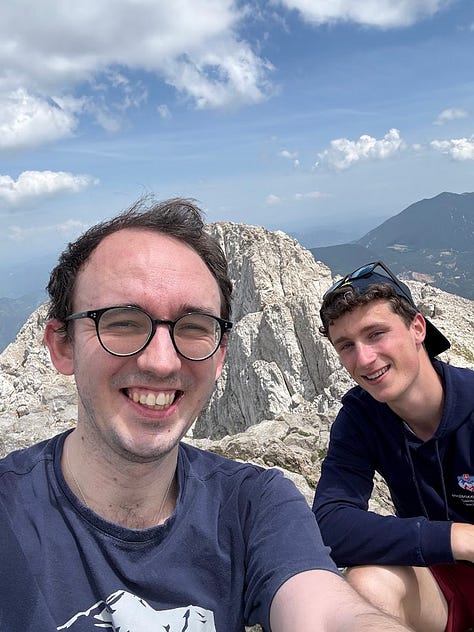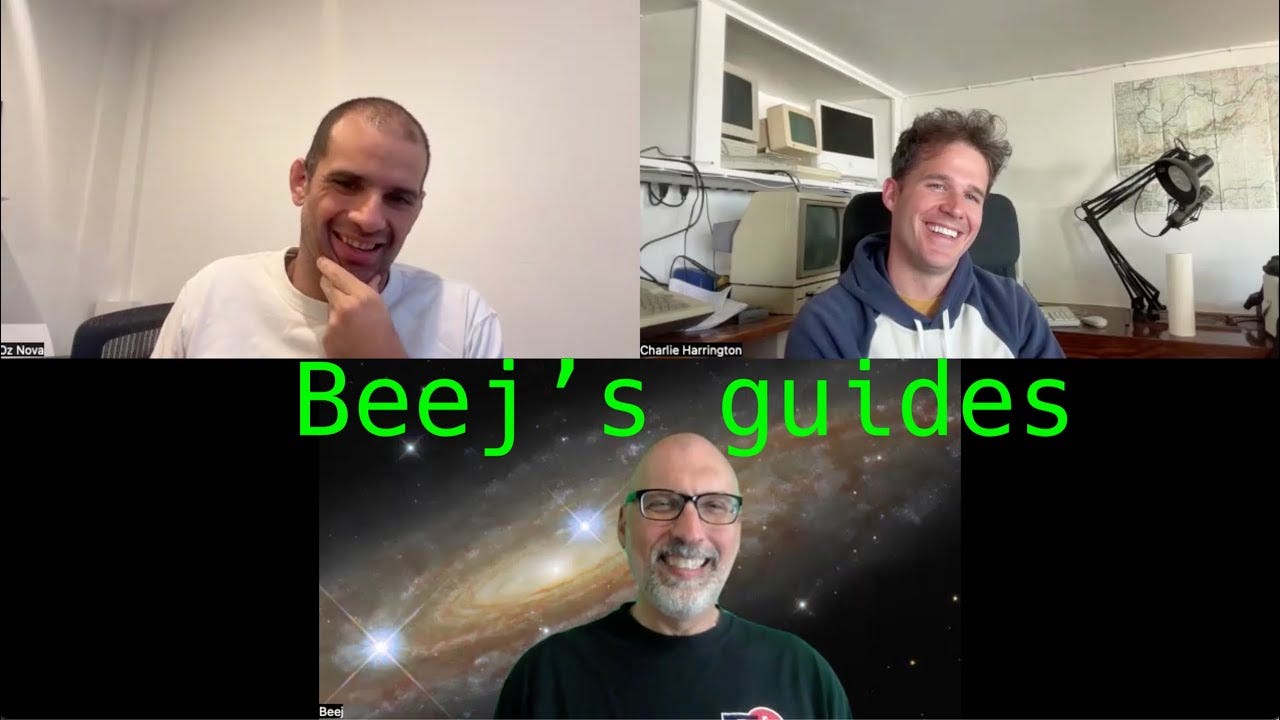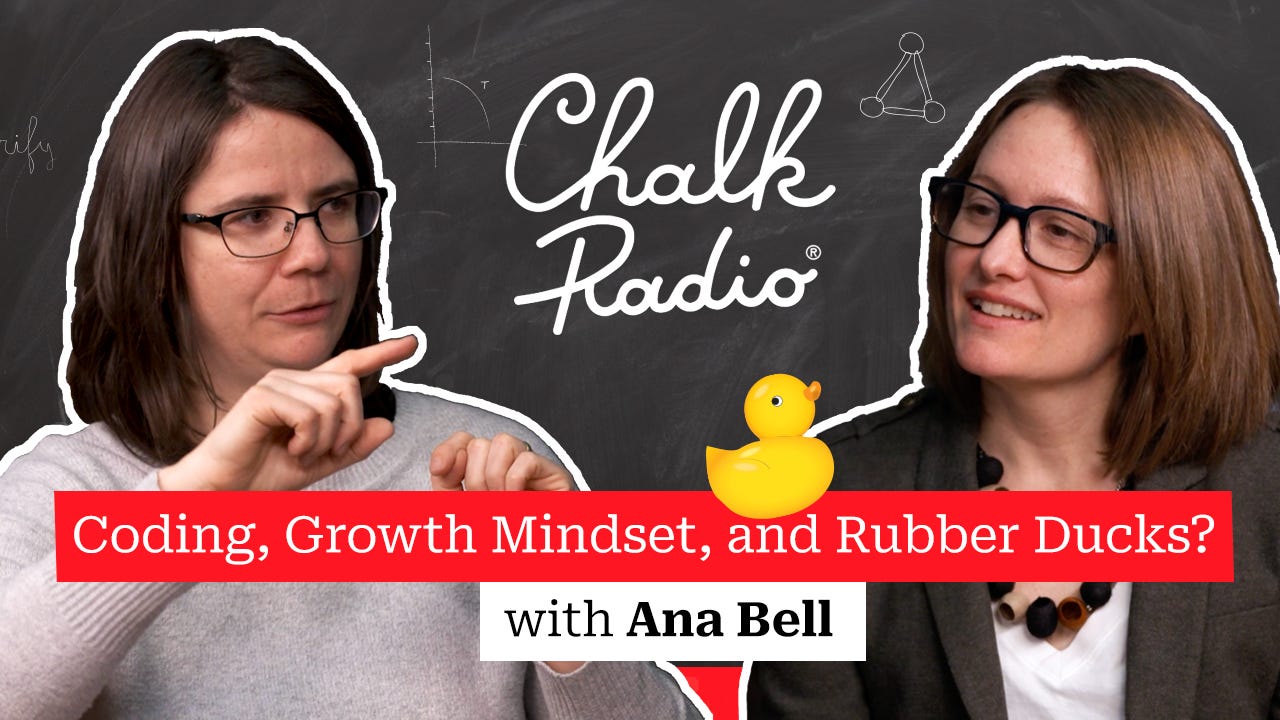Welcome!
The idea for this newsletter was born after attending the Koli conference in Finland last November. There I met CS educators, researchers, and tech professionals with incredible talent and so much to share. Despite this, in recent months I've been more involved in the computing education field and I miss having a place to share all these cool projects I find and other ideas that are going through my head. This newsletter is my attempt to give back to the computing education community all that it gives me and a place for me to share what I'm working on and thinking about.
My goal is to try and write something every week with topics divided into 6 sections:
The Learning Path – what I've been learning about recently
The Teaching Path – a few teaching resources I’ve been exploring recently
The PhD Student Is In - something I've been doing recently in my life as a CS PhD Student at University of Houston (I will be joining this incredible team in August!)
Thought For You to Ponder - open ideas or reflections on a CS education topic
Computing Education Community Highlights - something worth sharing from the computing education community - job postings, surveys, conferences/events...
Leisure Line - something I’m doing for fun lately
Hopefully you find something interesting or useful. Let me know if anything resonates – I would love to hear from you!
Brian (Beej Jorgensen) Hall Guides
This episode with Brian Hall on The CS Primer Show is gold! So many gems:
Falling in love with the challenge.
Taking the CS degree seriously and taking advantage of the problem-solving practice.
Building confidence by facing the unknown.
The power of community.
Finding the right balance with LLMs: using AI to solve problems we don't want to solve vs. using AI to solve the problem (no thinking, no effort, no understanding, no learning); enjoying the learning process (with AI) and what it means to be wrong, while working hard on a problem to reach a "flow state".
Understanding the limits of relying solely on LLMs.
Beej's Guide to Learning Computer Science
More guides (Networking, C, Git, Unix, Python, GNU, Bitbucket)
Watch the episode here!
Learn SQL by playing
On these websites you can learn SQL by playing. It's fun and you can learn a lot.
5 Best SQL Games to Master Database Skills in 2025
Why kids still need to learn to code in the age of AI
It made me think: The Raspberry Pi Foundation published a position paper setting out five arguments for why they think that kids still need to learn to code in the age of AI.
Two good bites from the industry
→ From Software Engineer to AI Engineer
Lots of great insights from Janvi Kalra in her interview with Gergely Orosz about her transition from Software Engineer to AI engineer (she currently works at Open AI).
Click this link and read my summary
→ Two Software Engineers Break Down SE's Most Controversial Topics
Here is my summary of a recent video by Aman Manazir and Sajjaad Khader, in which they discuss some of the most controversial topics in software engineering.
Click this link and read my summary
MIT lecturer Ana Bell on GenAI, Growth Mindset, and Rubber Ducks
Dr. Ana Bell, a senior lecturer in MIT's EECS Department who teaches popular introductory computer science courses, was invited to appear on the MIT OpenCourseWare Chalk Radio podcast. She discussed Python, the importance of a growth mindset, and the use of rubber ducks for debugging. She also explained how everyone can benefit from learning the basics of programming in the age of AI and how programming can help you take control of your future. The entire 29:39 episode is worth your time.
🎥 You can watch the full episode on YouTube
A pretty good introduction to the landscape of Foundation Models and Generative AI
MIT has released a course on the Future of AI: Foundation Models and Generative AI by MIT AI Researcher Rickard Brüel Gabrielsson. The latest update is from 2024, so it may seem outdated in AI terms, but it's still a good option if you're looking for a non-technical lecture series with applications in science and business.
You can find more information on the course website
🎥 You can watch the full episode on YouTube
Resources for Teaching in CS Education
→ Level Up Coding
If you are looking for a more visual approach to software engineering, I think this newsletter has some powerful ideas.
Check out Level Up Coding's archive
→ A tutorial on Cursor and Repo Prompt for controlling context
I've always been a fan of Ryan's teaching style (well, since Treehouse). Here's a tutorial on Cursor and Repo Prompt for controlling context, in case you're curious.
Get your hands dirty - nobody really knows how all the models work. This could be a way to integrate AI use in the classroom, explaining how modern IDEs work.
→ Super interesting tool for algorithms professors
It explains the execution of an algorithm step by step and creates a visual representation of each step.
🌎 Computing Education Community Highlights
Michael Kölling from King's College London is hiring! He's having trouble finding a good candidate. It's a fully funded PhD position available! Take a look at the LinkedIn post.
Majeed Kazemitabaar has recently joined the Computer Science department at the University of Alberta as an Assistant Professor starting in January 2026. Congrats BTW! This lab looks incredible. Consider joining if you're a PhD/MSc student interested in AI in Education and Human-AI Interaction.
🤔 Thought(s) For You to Ponder…
What is a university professor in 2025? What role will entertainment play?
One of the things that I think needs to be reconceptualized is what a university professor is.
The quality of the CS educator is the most important factor in whether someone learns (and that quality depends on a balanced combination of communication, entertainment, and expertise).
At a time when students have 200 times more stimulating educational choices, a professor cannot be a mummy in the classroom. From the moment a professor steps into the classroom, he or she is in "show business." Teacher training should include communication skills and entertainment, but currently there are no such courses in universities—it's not considered a marketable skill.
In the Age of AI and dopamine, we as educators have to make things interesting so that students enjoy them. It's a challenge! But when you have the serious intellectual education of young people in your hands, you can't afford to get it wrong—to make it boring. Because you have a great opportunity to shape their personality and their minds.
The PhD Student Is In
→ Wrote a new article on Medium about Vibe Coding
What does it mean to "vibe code" among Computer Science students? This spring, we ran a survey in the Amin (my advisor) Software Design course at University of Houston to explore CS students' experiences with vibe coding. Here's what I found. I'd love to hear your thoughts on it!
Read the full article here.
→ I have launched a new podcast: "Computing Education Things"
In this first episode, I sit down with Matthias Hauswirth, Associate Professor at USI (Università della Svizzera italiana), where he leads LuCE, the Lugano Computing Education research lab. Matthias and his team built a great site for learning programming with graphics. It's called PyTamaro, and Matthias came on to tell me about it.
Prefer YouTube? — watch the episode here
🪁 Leisure Line





Some pics from last weekend. I went with friends to Pedraforca mountain, near Barcelona (an hour and a half by car). The last 200 meters from Coll de Verdet to the summit are easy, but exposed and almost unprotected, so it is advisable to wear appropriate footwear.
That's all for this week. Thank you for your time. I value your feedback, as well as your suggestions for future editions. I look forward to hearing from you in the comments.
To close and on repeat, the new album by Ben Rector. See you in the next one!















